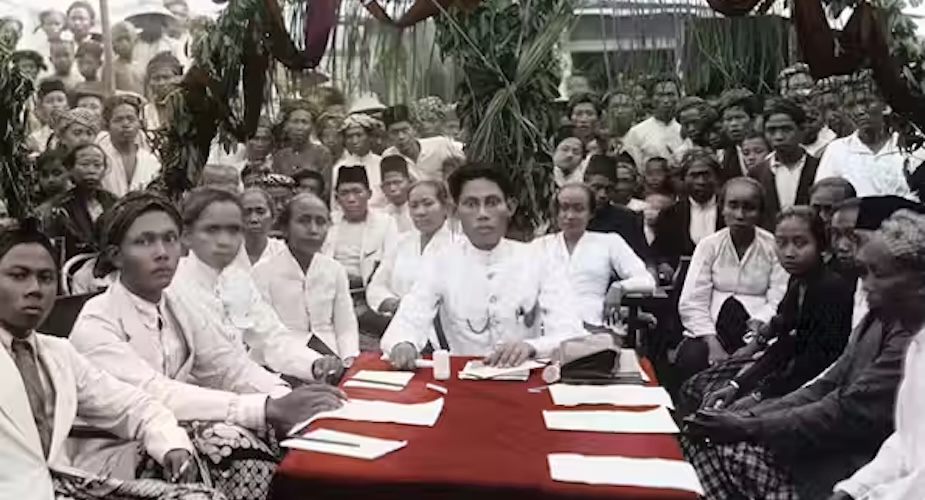No joy for extremists in post-bomb Indonesia
Ed Aspinall
Immediately after the bombings in Bali on 12 October, there was much speculation in the foreign, especially Australian, press, that this was a watershed event for Indonesian politics. Nothing in the country would now be the same, or so the commentators argued. Political alignments would shift, the military would reassert itself, Islamic radicalism surge and the country face international isolation.
Certainly, it is possible to imagine circumstances in which some of the dramatic predictions might have been realised. In particular, the way that the government responded to the bombings was crucial for Indonesia's relations with the outside world. If foreign powers like Australia and, especially, the US had judged it was not seriously investigating the attack, or, worse still, turning a blind eye to its perpetrators, then Indonesia could have become a pariah state, with disastrous consequences.
Instead, the outcome on this score has been close to the reverse. There was unprecedented, large-scale and effective cooperation between Indonesian and foreign police. Within weeks, those responsible began to be arrested and foreign officials heaped praise on the government and police. Indonesia had won its spurs as a reliable ally in the War on Terror.
In the context of the surprisingly effective police response, most of the more dramatic predictions have not come true.
The myth of military omnipotence
In particular, the Bali bombing did not become a pretext for a political resurrection for the Indonesian military (TNI), even if some generals tried to use it for this purpose. For example, immediately after the bombing, the hardline Army Chief of Staff, Ryamizard Ryacudu, ordered the army hierarchy to 're-open the intelligence network' and stated that there should be no further talk of abolishing the military's territorial structure.
It is true that the post-September 11 world and Megawati's Indonesia represent an increasingly benign climate for the TNI. Immediately after the downfall of President Suharto in May 1998, the TNI was excoriated domestically and internationally for its record of human rights abuses. Officers felt that their institution was under siege.
Nowadays, President Megawati herself is sympathetic to the views of many of the more hardline generals (Ryamizard is reportedly a personal favourite). After September 11 and, especially Bali, senior US, Australian and other Western officials made many public comments about the need to restore military cooperation with Indonesia, adding further to TNI officers' views that human rights are moving off the international agenda.
It is no surprise that there are reports that some officers privately believe that it is only a matter of time before military dominance over politics will be restored. There have certainly been many signs of increased military confidence, such as the string of acquittals in the East Timor human rights trials. On the ground, especially in places like Papua and Aceh, military brutality remains common.
However, Indonesia still has a very long way to go before the military's dominance is restored. New anti-terrorism regulations, for example, do little to enhance the military's power. Even on core issues of security policy, there are signs that the hawks do not have it all their own way. For example, the December 2002 peace agreement in Aceh (see the article in this issue) may be vulnerable to sabotage by military hardliners, but it came about despite their frequently-stated objections to dialogue with 'separatists'.
Despite the existence of hardline elements within it, the TNI remains greatly constrained by continuing public suspicion and hostility. While there has been much disillusionment with the outcome of reformasi, there is not (yet) any general clamour in the urban middle classes, let alone other parts of the population, for the return of authoritarian rule. One poll, conducted by the newspaper Kompas last October, revealed that only 42 per cent of respondents believed that the TNI had a 'good image', down from 58 per cent a year earlier.
Most officers recognise this poor public image, and it accounts for their circumspection when dealing with political issues. Hence, Armed Forces Commander General Endriartono Sutarto repeatedly stressed that TNI would not take advantage of the new anti-terrorism rules and the post-bombing climate to stage a political comeback.
The bombings and associated security atmosphere may thus have marginally strengthened the hands of the military, but not to the dramatic degree first feared.
Challenges for Muslims
A second important consequence of the Bali bombings has been to increase the isolation of hardline Islamist groups which advocate violence, although here too we shouldn't exaggerate the impact.
It is well known that the majority of Indonesia's Muslim community supports religious tolerance and pluralism. Even so, since 1998 small hardline and violent groups have flourished. Underlying causes are complex, but immediate political factors have been influential. For example, it is widely believed that elements from TNI supported some militant groups, including the Jihad Militia (Laskar Jihad) which sent several thousand fighters to participate in communal conflict in Maluku.
In addition, leaders of mainstream Islamic organisations (former President Abdurrahman Wahid was a notable exception) were often reluctant to confront the militants and their ideas. Vice-President Hamzah Haz, head of the Muslim United Development Party (PPP) even visited Ja'far Umar Thalib, the head of Laskar Jihad, and Abu Bakar Ba'asyir, alleged Jemaah Islamiyah leader, when they were being detained for, or accused of instigating, violent acts. Some mainstream Muslim leaders also tacitly endorsed violence when they believed Muslims were under attack (for example, Amien Rais, speaker of the People's Consultative Assembly, in 2000 publicly backed groups which wanted to go to Maluku to engage in jihad).
Early after the bombing, as Greg Fealy explains in this issue, there were widely aired views in the Islamic community that such a heinous act could not possibly have been perpetrated by Muslims and must instead have been the work of foreign intelligence agencies. The police investigation initially reinforced suspicions about victimisation of Muslim groups, but the evidence it turned up eventually, it seems, convinced much of the public that an Islamist network was indeed responsible. This has significantly changed the climate in which militant Islamist groups operate. Leaders like Hamzah Haz have been forced to disavow their former flirtation with hardline groups.
There have also been signs (actually first visible some weeks before the bombings) that the security forces are taking a tougher line against violent groups, evidenced by arrests of leaders of Laskar Jihad and the 'anti-vice' vigilante group, the Islamic Defenders' Front (FPI). After the Bali bombings, General Endriartono Sutarto several times stated that all informal militia in the country should be disbanded, a step taken by Laskar Jihad and FPI (although at least in the former case apparently having more to do with internal problems than government pressure).
In the wake of the bombings, many liberal Muslim intellectuals adopted a primarily defensive posture, reiterating that Islam has nothing to do with terrorism. At times, it appeared there was almost a syndrome of denial that Islamic doctrine could be used to justify violence. Some Muslim leaders, however, took the offensive and moved to more vigorously promote religiously liberal and pluralistic ideas (see box).
Consolidation of a new political order
A third conclusion one may draw after the Bali bombings is that, despite the authorities' successes in tracking down the perpetrators, Megawati's government has been unable to reap many political benefits. Much public praise has been directed toward the police (with many letter-writers telling newspapers that this was the first time they had ever felt proud of the Indonesian police forces).
But in the highest ranks of government there were many signs of the familiar bickering among cabinet members and policy drift. Megawati herself initially reacted astutely, visiting the site of the bombing the day after it took place. But within days, she had reverted to her normal remote style, and there was little sign of either symbolic or effective policy leadership on her part.
Megawati's performance thus reinforced growing dissatisfaction with her personal leadership style, not only in the broad public but also in within the ranks of her own party, the Indonesian Democratic Party of Struggle (PDI-P). Sections of the party were critical of her decision to endorse the re-election of Jakarta mayor Sutiyoso (who is widely believed by Megawati's supporters to be responsible for a 1996 military attack on their party's headquarters). In recent months some senior party members have voiced increasingly explicit criticisms of the government and its performance.
Even so, Megawati still ranks consistently highest in popularity polls for future presidential candidates. Despite early predictions in some quarters, the Bali bombing and its aftermath have not appreciably improved the prospects of a 'green' Islamic ticket (probably with Amien Rais as its chief candidate) in 2004 elections.
Overall, then, what can we conclude about Indonesian politics after the Bali bombings? Above all, the violence and the response to it seem to have reinforced previously visible trends. Some of the tumult of the immediate post-Suharto period is dying down (though it can easily erupt again, especially in response to Indonesia's economic and social crisis, as a series of large demonstrations against price rises in January illustrate). The more extreme and violent Islamist groups are on the defensive. The worst communal violence in places like Maluku and Poso in Central Sulawesi seems to be declining. There are even signs, if not of permanent solutions, at least of reduced tensions in Aceh and Papua. The military is more confident. The government is still ineffective, but it looks stable.
A new hybrid political order is settling into place. Indonesia does not have a perfect democracy with full-scale civilian supremacy, human rights, effective law enforcement, social justice and the like. But nor is it a system where the military and central government bureaucrats determine the fate of the country like they once did.
Ed Aspinall (edward.aspinall@ asia.usyd.edu.au) is an IRIP board member and lecturer in Asian Studies at the University of Sydney.











